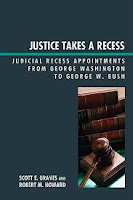An article in the National Law
Journal, New Congressional Research Report Looks at Recess Appointments, examines the D.C.
Circuit’s recent ruling in Canning v. National Labor Relations Board in which then-Chief Judge David Sentelle
restricted the power of the president to make recess appointments. The appellate
court said the president can only make an appointment under "the
recess" of the Senate. The case is headed to the U.S. Supreme Court which
could uphold the decision, marking a shift toward increased Senate control over
the appointment of government officials. The article cites a recent Congressional
Research Service report entitled The Recess Appointment Power AfterNoel Canning v. NLRB: Constitutional Implications by legislative attorneys
Todd Garvey and David Carpenter.
The report states that the case could also decrease the frequency of presidential recess appointments. Since 1981, more than half of all recess appointments have been made in Senate recesses that were during a session, something the president would no longer be able to do. “Thus, by limiting both the periods in which a President may make recess appointments, and the vacancies that may be filled by such appointments, the decision likely would strengthen the Senate’s 'Advice and Consent' role, while restricting the President’s authority to make unilateral appointments.”
The report states that the case could also decrease the frequency of presidential recess appointments. Since 1981, more than half of all recess appointments have been made in Senate recesses that were during a session, something the president would no longer be able to do. “Thus, by limiting both the periods in which a President may make recess appointments, and the vacancies that may be filled by such appointments, the decision likely would strengthen the Senate’s 'Advice and Consent' role, while restricting the President’s authority to make unilateral appointments.”
 The Brooklyn Law School Library
has in its collection Justice
Takes a Recess: Judicial Recess Appointments from George Washington to George
W. Bush (Call #KF8776 .G666 2009) by Scott E. Graves and Robert M. Howard.
The book explains how the Constitution allows the president to “fill up all
Vacancies that may happen during the Recess of the Senate, by granting
Commissions which shall expire at the End of their next Session.” Examining
every judicial recess appointment from 1789 to 2005, the book addresses how presidents
have used recess appointments over time and whether the independence of
judicial recess appointees is compromised. They argue that these appointments
can upset the separation of powers envisioned by the Framers, shifting power
away from one branch of government and toward another.
The Brooklyn Law School Library
has in its collection Justice
Takes a Recess: Judicial Recess Appointments from George Washington to George
W. Bush (Call #KF8776 .G666 2009) by Scott E. Graves and Robert M. Howard.
The book explains how the Constitution allows the president to “fill up all
Vacancies that may happen during the Recess of the Senate, by granting
Commissions which shall expire at the End of their next Session.” Examining
every judicial recess appointment from 1789 to 2005, the book addresses how presidents
have used recess appointments over time and whether the independence of
judicial recess appointees is compromised. They argue that these appointments
can upset the separation of powers envisioned by the Framers, shifting power
away from one branch of government and toward another.
No comments:
Post a Comment